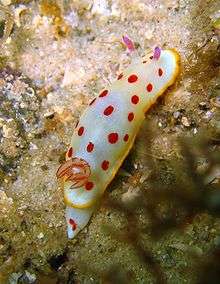Goniobranchus splendidus
Goniobranchus splendidus is a species of colourful sea slug, a dorid nudibranch, a marine gastropod mollusc in the family Chromodorididae.[2][3] The specific epithet splendida means splendid in reference to the colouring, because this nudibranch has large red spots on a white background, a yellow line at the mantle edge, and magenta rhinophores.
| Goniobranchus splendidus | |
|---|---|
 | |
| Scientific classification | |
| Kingdom: | Animalia |
| Phylum: | Mollusca |
| Class: | Gastropoda |
| Subclass: | Heterobranchia |
| Order: | Nudibranchia |
| Suborder: | Doridina |
| Superfamily: | Doridoidea |
| Family: | Chromodorididae |
| Genus: | Goniobranchus |
| Species: | G. splendidus |
| Binomial name | |
| Goniobranchus splendidus | |
| Synonyms[2] | |
| |
Distribution
This species was described from Port Jackson, New South Wales, Australia.[1] It is one of a group of similar red-spotted chromodorids from south-eastern Australia which form a mimicry ring.[4][5]
Description
Goniobranchus splendidus is a chromodorid nudibranch which has an opaque white mantle with large, scattered red spots. In the northern part of its range these spots coalesce and may form a single large red patch in the middle of the back. The edge of the mantle is yellow. The rhinophore clubs are red with white edges to the lamellae. The gills have a two fine red lines on the outer rachis and white leaves.[6] Compare with Goniobranchus daphne, Goniobranchus hunterae and Goniobranchus tasmaniensis which all have similar coloration.[7]
References
- Angas, George French. 1864. Description d'espèces nouvelles appartenant à plusieurs genres de Mollusques Nudibranches des environs de Port-Jackson (Nouvelle-Galles du Sud), accompagnée de dessins faits d'après nature. Journal de Conchyliologie, series 3, 12:43-70, pls. 4-6, page 55.
- Bouchet, P. (2012). Goniobranchus splendidus. Accessed through: World Register of Marine Species on 2012-05-02
- Johnson R.F. & Gosliner T.M. (2012) Traditional taxonomic groupings mask evolutionary history: A molecular phylogeny and new classification of the chromodorid nudibranchs. PLoS ONE 7(4): e33479
- Rudman, W.B. (1991) Purpose in Pattern: the evolution of colour in chromodorid nudibranchs. Journal of Molluscan Studies, 57, (T.E. Thompson Memorial Issue): 5-21.
- Rudman W.B. (1983) The Chromodorididae (Opisthobranchia: Mollusca) of the Indo-West Pacific: Chromodoris splendida, C. aspersa and Hypselodoris placida colour groups. Zoological Journal of the Linnean Society 78: 105-173. page(s): 114
- Rudman, W.B., 1999 (June 1) Chromodoris daphne (Angas, 1864). [In] Sea Slug Forum. Australian Museum, Sydney.
- Debelius, H. & Kuiter, R.H. (2007) Nudibranchs of the world. ConchBooks, Frankfurt, 360 pp. ISBN 978-3-939767-06-0 page(s): 161